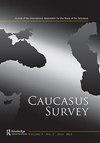The statehood of Eurasia’s de facto states: an empirical model of engagement by great powers and patrons
IF 0.5
Q3 AREA STUDIES
引用次数: 2
Abstract
ABSTRACT The article designs an empirical model to compare the level of engagement of de facto states in Eurasia by three great powers and non-great power patron states. The authors build diagrams based on three variables – military, political, and economic – whose indicators are determined by an expert survey. Russia engages the most de facto states and to the greatest degree, while the US falls behind since engaging the de facto states is not a key national security concern. However, neither holds a universal principle of engaging de facto states – each case is treated based on broader political and national security considerations. China, wary of domestic separatism, has no military ties with the de facto states and limited economic and political engagement. Taiwan scores the highest among the de facto states with the Turkish Republic of Northern Cyprus and Abkhazia falling behind by a large margin. The Peoples’ Republics of Luhansk and Donetsk and Transnistria score the lowest. The study reveals, the degree of engagement matters more than the number of the UN member states formally recognizing a de facto state.欧亚大陆事实上的国家地位:大国和赞助人参与的经验模型
本文设计了一个实证模型来比较三个大国和非大国庇护国在欧亚大陆的实际国家参与程度。作者根据三个变量——军事、政治和经济——构建图表,这些变量的指标由专家调查确定。俄罗斯与大多数事实上的国家进行了最大程度的接触,而美国则落在了后面,因为与事实上的国家接触并不是一个关键的国家安全问题。然而,这两种做法都不具备与事实上的国家接触的普遍原则——每个案例都是基于更广泛的政治和国家安全考虑来处理的。出于对国内分裂主义的警惕,中国与这些事实上的国家没有军事联系,经济和政治接触也很有限。台湾在实际存在的国家中得分最高,北塞浦路斯土耳其共和国和阿布哈兹远远落后。卢甘斯克人民共和国、顿涅茨克人民共和国和德涅斯特河沿岸人民共和国得分最低。研究显示,参与程度比正式承认一个事实上的国家的联合国成员国的数量更重要。
本文章由计算机程序翻译,如有差异,请以英文原文为准。
求助全文
约1分钟内获得全文
求助全文
来源期刊

Caucasus Survey
Arts and Humanities-History
CiteScore
1.30
自引率
9.10%
发文量
4
期刊介绍:
Caucasus Survey is a new peer-reviewed, multidisciplinary and independent journal, concerned with the study of the Caucasus – the independent republics of Armenia, Azerbaijan and Georgia, de facto entities in the area and the North Caucasian republics and regions of the Russian Federation. Also covered are issues relating to the Republic of Kalmykia, Crimea, the Cossacks, Nogays, and Caucasian diasporas. Caucasus Survey aims to advance an area studies tradition in the humanities and social sciences about and from the Caucasus, connecting this tradition with core disciplinary concerns in the fields of history, political science, sociology, anthropology, cultural and religious studies, economics, political geography and demography, security, war and peace studies, and social psychology. Research enhancing understanding of the region’s conflicts and relations between the Russian Federation and the Caucasus, internationally and domestically with regard to the North Caucasus, features high in our concerns.
 求助内容:
求助内容: 应助结果提醒方式:
应助结果提醒方式:


